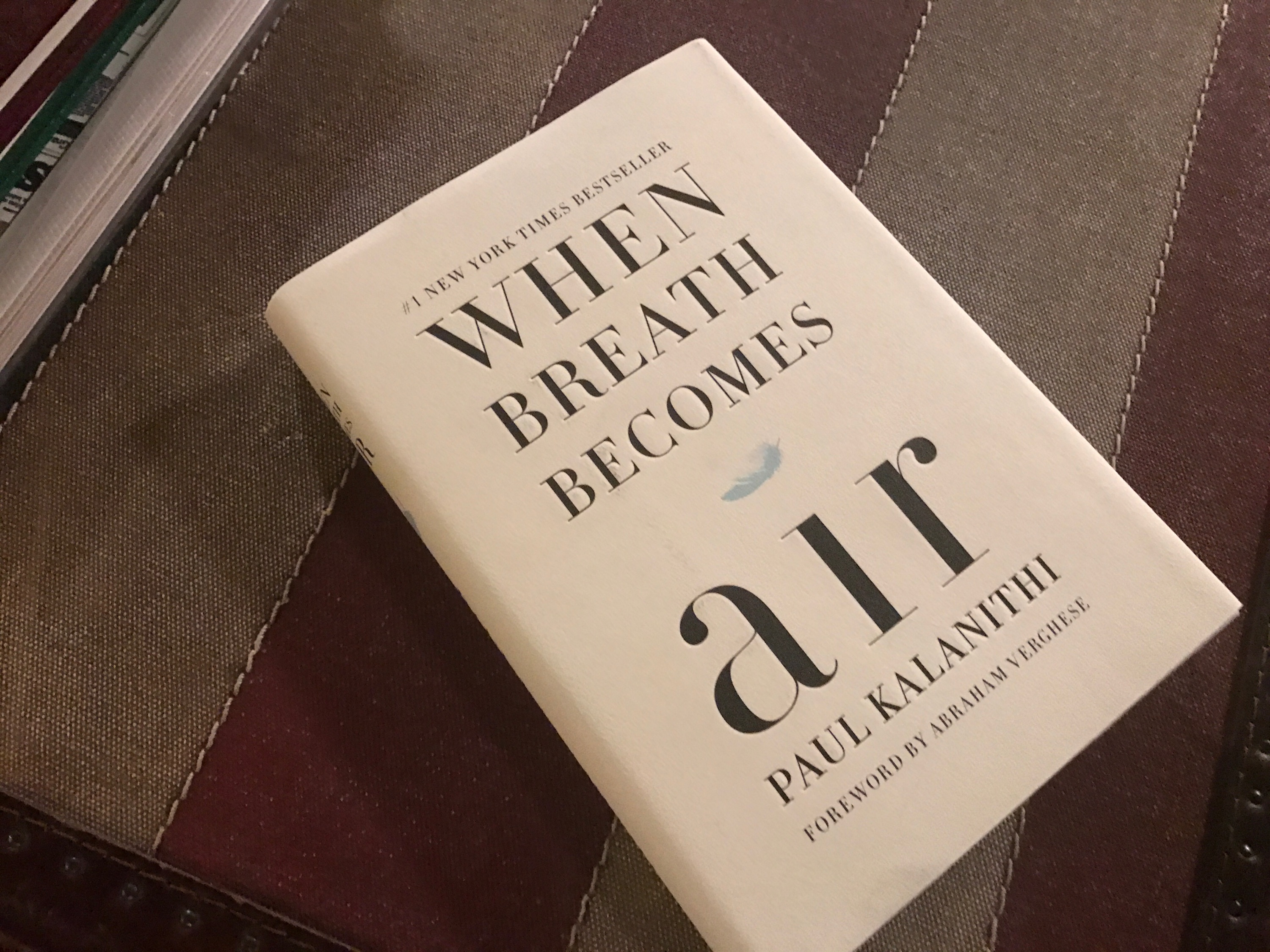I just finished reading When Breath Becomes Air by Paul Kalanithi and have since felt a strong urge to write about it… so here we are.
The book, which has been a New York Times Bestseller seemingly since it came out last year, is a memoir about a resident neurosurgeon’s path through a stage IV Lung Cancer Diagnosis. The story is, well, ultimately very sad and touching, but it explores the emotions of someone headed towards death as the result of a terminal illness.
I don’t claim to know what it is like to live with Cancer, simply because I have no idea, but I was able to identify with quite a few of the emotions described in the heart wrenching book. In more ways than one, I was able to put myself into the very hospital bed Kalanithi found himself in throughout his days as a patient.
The book is about more than his life with Cancer, but the part that I was able to identity so strongly with was his main point of contention, which was that he struggled to cope with the unpredictability of a terminal diagnosis and initially his oncologist’s assertion that life expectancy isn’t a defining factor in planning for the future.
In the “era of information” in which we live, I always find myself looking for an answer. I know Kalanithi was too during his time living with Cancer.
He noted that during his time of study to become a neurosurgeon-scientist he had to account for making precise distinctions between life and death. He gave several examples, during his time as a care provider, of discussing life and death situations with his patients. He felt that it was his responsibility to understand the necessary information around a particular case so that he could weigh the undeniable risks of brain surgery, which is, after all, what a neurosurgeon does. Was it, for example, worth it for a severely ill patient to undergo a traumatic surgery to add only a few years of life at the cost of that patient losing the ability to talk based on a tumor’s location in the brain?
It this realization during his residency that was when he also recognized that patients and cases are, in fact, people, not just numbers taught during medical school.
I think we talk so much these days about clinical studies and the community of patients as a whole that we often neglect the human nature behind medicine. Any sort of illness, as Kalanithi notes, is something that is capable of sending an entire family in a downward tailspin. Those families are the ones dealing with the brunt force of every single facet of the illness, from the treatments to physical qualities of it. I know that feeling first hand when I see the look on someone’s face each time I cough up blood. It’s just as much a feeling of vulnerability as it is horror and confusion.
I have concluded that the countless discussions that Kalanithi had with is patients over the course of his extensive residency are ultimately what led him to have such a thought provoking experience of coping with his Cancer.
He first noticed that the “patient” experience was very different from that of the doctor when he started physical therapy. He said that he would always prescribe PT to his patients without actually physically understanding the work that went into it for very sick people. Beyond that he said the he also found himself looking forward to his appointments with his oncologist.
I had never thought of looking forward to an appointment prior to reading When Breath Becomes Air, but he it is so true.
When I was younger I resented going to the doctor for a check-up. Now it’s different. I’ve realized that I look at my doctor appointments not only as a time to see my progress and the result of my hard work, but also just to talk it out with my doctor. I think it’s a nice feeling to be able to talk about the intricacies of the disease with someone who really understands and can give feedback, both positive and negative. Not that my parents or friends don’t have an understanding of what I go through, they definitely do, but it’s just different when you talk to someone who lives it from the complete opposite end of things. And don’t get me wrong, I absolutely hate getting hospitalized, being sent in for a procedure or showing up to the clinic in an emergency situation, but being there when everything is planned out is almost nice.
We assert that if we may not know something, someone out there must, and I think in the eyes of a patient, the doctor is that lifeline. Kalanithi was seemingly obsessed with his position on the “Kaplan-Meier” (the formula used to compute a patient’s data to estimate his or her life expectancy with an illness). He couldn’t come to grips with his oncologist’s refusal at first, but later understood. He said that the doctor’s responsibility is leading the patient down the path of unknown – the unknown being the illness. Decisions ultimate come down to the patient and his support system, but the doctor is the one who provides the necessary input to make the right decision. Kind of like when Kalanithi said he was discussing the idea of a life worth living (or death) with patients who were in need of extreme brain surgeries. I think he finally understood the other side of it.
The relationship with his doctor was both strong and admirable, during the tough times and good. I think that was the underlying reason behind his feelings. Beyond that, though, I think that’s what led him to recognize that the patient experience starts where the doctor experience stops, and vice versa.
I pride myself on being a well educated patient on most parts of CF, but I too often feel the stress of not knowing answers to questions I come across in day to day life. I guess that is part of growing up, but when faced with the morality of an illness, the relationship that exists with my doctor is one that can provide a sense of calm, or relief, in the appropriate scenario. In a way if feels like an ally is there is remove the burden of unease. I absolutely think it’s important to have a good relationship with one’s care team, because ultimately those are the people you are relying on in the toughest of times.
Ultimately I don’t want to give away too much of the book, you know, the nitty gritty of his life, the role his family played in his support system and overall healthcare experiences because I do think the story is worth the time spent reading.
But I will say that when I initially told my friends that I intended to read When Breath Becomes Air I received a mix of caution and excitement in return. I felt that they thought I would find myself in a precarious situation, after all I would be reading about a man dying of severe lung disease. Maybe they were right. I pictured myself suffering through the described coughing, chest pain and shortness of breathe; I knew exactly what it looked like when Kalanithi talked about being attached to oxygen or the BiPAP machine, something my future may or may not hold for me; and I also understood the quick changes in health that Kalanithi experienced. At the same time, however, I think I was excited to read about Kalanithi’s life because I knew that it would motivate me to be the absolute best patient possible, and I think it did.
If you’re reading this as someone who has a strong relationship with someone who has a chronic illness, I definitely encourage you to read When Breath Becomes Air. It’ll give you a look at the life of someone with terminal illness that you may not otherwise understand.





